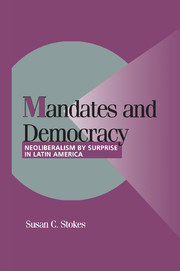Crossref Citations
This Book has been
cited by the following publications. This list is generated based on data provided by Crossref.
Barreiro, Belén
2001.
Controlling Governments.
p.
17.
Maravall, José María
2001.
Controlling Governments.
p.
157.
Levitsky, Steven
2001.
Organization and Labor-Based Party Adaptation: The Transformation of Argentine Peronism in Comparative Perspective.
World Politics,
Vol. 54,
Issue. 1,
p.
27.
Hagopian, Frances
and
Mainwaring, Scott P.
2001.
The Third Wave of Democratization in Latin America.
Murillo, M. Victoria
2002.
Political Bias in Policy Convergence: Privatization Choices in Latin America.
World Politics,
Vol. 54,
Issue. 4,
p.
462.
Beer, Caroline C.
2002.
Institutional Change in Mexico: Politics after One-Party Rule.
Latin American Research Review,
Vol. 37,
Issue. 3,
p.
149.
Marcus-Delgado, Jane
2003.
Trust, Corruption, and the Globalization Tango.
Social Text,
Vol. 21,
Issue. 4,
p.
139.
Carey, John M.
2003.
The Reelection Debate in Latin America.
Latin American Politics and Society,
Vol. 45,
Issue. 1,
p.
119.
Levitsky, Steven
2003.
Transforming Labor-Based Parties in Latin America.
Baker, Andy
2003.
Why is Trade Reform So Popular in Latin America?: A Consumption-Based Theory of Trade Policy Preferences.
World Politics,
Vol. 55,
Issue. 3,
p.
423.
Johnson, Gregg B.
and
Crisp, Brian F.
2003.
Mandates, Powers, and Policies.
American Journal of Political Science,
Vol. 47,
Issue. 1,
p.
128.
Lora, Eduardo A.
Panizza, Ugo G.
and
Quispe-Agnoli, Myriam
2003.
Reform Fatigue: Symptoms, Reasons, Implications.
SSRN Electronic Journal,
Burgess, Katrina
2003.
Explaining Populist Party Adaptation in Latin America.
Comparative Political Studies,
Vol. 36,
Issue. 8,
p.
881.
Biglaiser, Glen
and
Brown, David S.
2003.
The Determinants of Privatization in Latin America.
Political Research Quarterly,
Vol. 56,
Issue. 1,
p.
77.
Fish, M. Steven
2003.
Political Economy of Transition and Development.
Vol. 5,
Issue. ,
p.
183.
Weyland, Kurt
2004.
Neoliberalism and Democracy in Latin America: A Mixed Record.
Latin American Politics and Society,
Vol. 46,
Issue. 1,
p.
135.
CRISP, BRIAN F.
and
BOTERO, FELIPE
2004.
Multicountry Studies of Latin American Legislatures: A Review Article.
Legislative Studies Quarterly,
Vol. 29,
Issue. 3,
p.
329.
Biglaiser, Glen
and
DeRouen, Karl
2004.
The Expansion of Neoliberal Economic Reforms in Latin America.
International Studies Quarterly,
Vol. 48,
Issue. 3,
p.
561.
Barnett, Michael
and
Duvall, Raymond
2004.
Power in Global Governance.
Schneider, Ben Ross
2004.
Organizing Interests and Coalitions in the Politics of Market Reform in Latin America.
World Politics,
Vol. 56,
Issue. 3,
p.
456.



